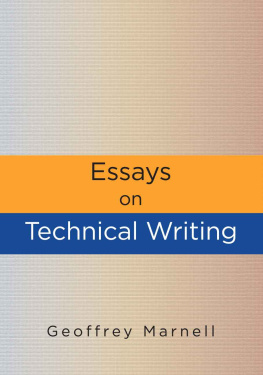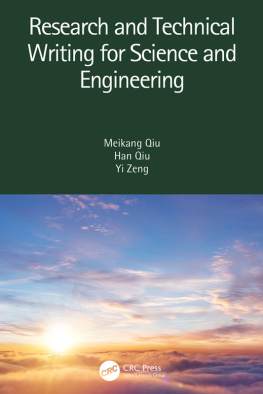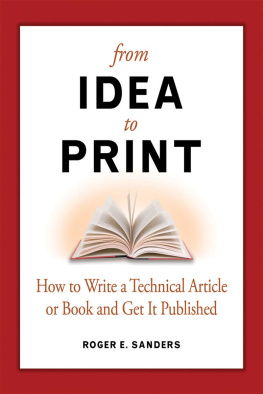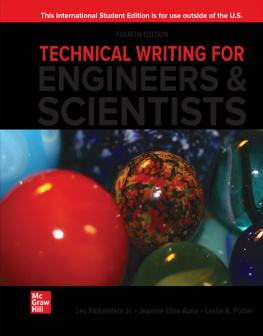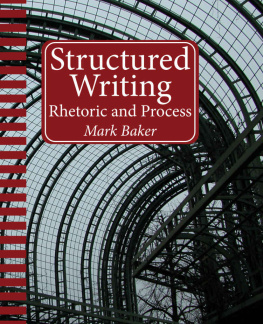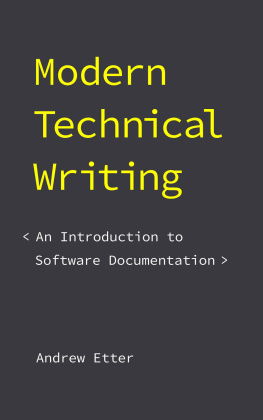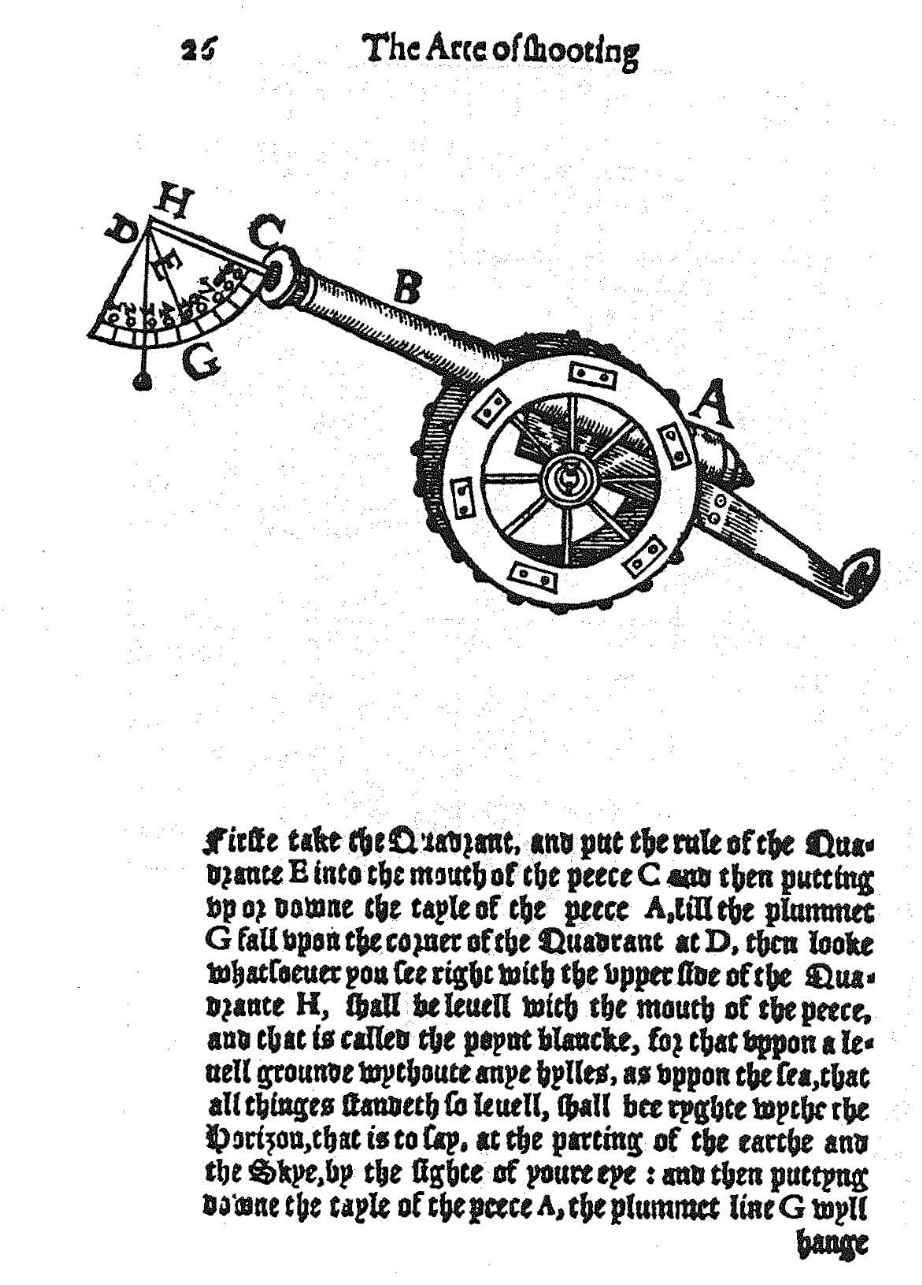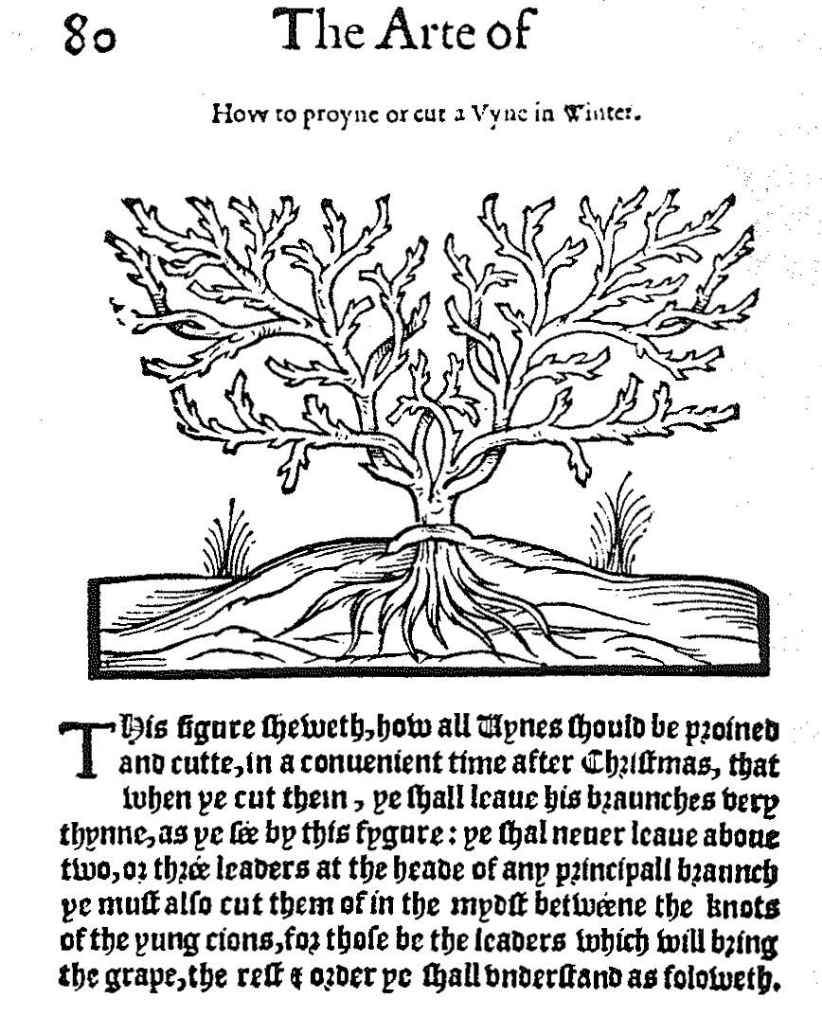Geoffrey Marnell
Essays
on
Technical
Writing
Burdock Books
Copyright Geoffrey Marnell 2016
Geoffrey Marnell has asserted his right to be identified as the author of this work.
All rights reserved. No part of this book may be reproduced or transmitted by any person or entity, including internet search engines or retailers, in any form or by any means, electronic or mechanical, including photocopying (except under the statutory exceptions provisions of the Australian Copyright Act 1968 ), recording, scanning or by any information storage and retrieval system without the prior written permission of the publisher.
First published in Australia in 2016 by
Burdock Books
www.burdock.com.au
info@burdock.com.au
National Library of Australia Cataloguing-in-Publication entry
Creator: Marnell, Geoffrey R., author.
Title: Essays on Technical Writing / Geoffrey Marnell.
ISBN: 978-0-9943666-8-9 (ebook)
Notes: Includes bibliographical references and index.
Subjects: Technical writing.
Communication of technical information.
Dewey Number: 808.0666
For Melinda
with thanks to Louise Correcha for editorial assistance
About the author
Geoffrey Marnell has a masters degree and doctorate from the University of Melbourne, gained by research in philosophy at the universities of Melbourne and Oxford. He has published widelyon such topics as language, technical writing, psychology and mathematics.
Geoffrey tutored in philosophy at the University of Melbourne in the late 1970s and early 1980s before leaving academia to establish Abelard Consulting, a company that has, for close to 30 years, provided writing services, resources and training to organisations worldwide.
Geoffrey returned to the University in 2005 when, at the invitation of the English Department, he designed a course on technical writing and editing. He taught the course for nine years as part of the Universitys Publishing and Communications Program in the School of Culture and Communication.
In addition to language, Geoffreys interests include literature, music, film and travel.
By the same author
Correct English: Reality or Myth?
Mindstretchers
Think About It!
Numberchains
1: Technical writing: whats in a name?
What is technical writing? How technical does technical writing need to be? And is the title of the professional suited to what we do?
Lets start off with a spot of surface analysis: at the simplest level, there are two broad views on what technical writing is: a prescriptivist view and a descriptivist view.
Prescriptivist view
The prescriptivist view is that technical writing is writing about technical matters:
A working definition of technical communication should recognize the technical nature of the subject (Zimmerman & Clark 19987, p. 3)
Technical writing is a form of written communication that conveys scientific and technical information in a clearly defined and accurate form. (Haydon 1995, p. 2)
A common definition of technical is relating to or connected with the mechanical or industrial arts and the applied sciences ( Macquarie Dictionary ). This is a definition that chimes well with many who are unaware of what our profession does. And yet it doesnt marry with the work that many technical writers actually do. It is stretching the meaning of technical to consider the following domains especially technical:
bookkeeping
human resources procedures
gaming.
And yet it is technical writers who are called on to write procedures explaining how to reconcile bank accounts, how to apply for long-service leave and how to play Tetris.
Descriptivist view
The descriptivist view ignores the denotation and connotation of the word technical and looks instead at what actually goes on in our profession. By taking such a view, we find that:
technical writers mostly engage in procedural writing (that is, instructional or how-to writing)
the subject matter is sometimes but not always technical (as the word is commonly understood).
On the descriptivist view, it is the type of writing we do, not the subjects we write about, that identifies us as technical writers. Here are some definitions in that vein:
the large body of writing which may be called technical writinghow-to books or procedure manuals on a variety of topics: farming, gardening, animal husbandry, surveying, navigation, military science, accounting, recreation, estate management, household management, cooking, medicine, bee-keeping, silkworm production (Tebeaux 1997, p. 93)
The purpose of technical communication is generally to instruct the reader (as opposed to scientific communication or journalism, which inform the reader). For example, online help teaches the reader how to perform various tasks using a software package; a car manual teaches the reader how to maintain and repair a car; and a set of illustrations teaches airline passengers how to behave in the event of an emergency.
Thus technical writing could be considered as the dissemination of practical knowledge (technical or otherwise), that is, knowledge about how to do things .
The descriptivist view is, I suggest, the better approach to defining our profession. Just as prescriptivist grammars risk irrelevancy by insisting on rules that few follow, a prescriptivist view of technical writing, with its definitional straight-jacket, risks irrelevancy. A parallel with science might be instructive. Science was once called natural philosophy , but to insist that what natural philosophy is should always be tied to the denotation and connotation of the word philosophy would have been futile. It would have led, as eventually happened, to a new name for the discipline.
Just as natural philosophy connotes a limited approach to knowledgean a priori approach based on reason alone, unlike science with its a posteriori approach based on observation and experiment technical writing connotes a limited approach to practical knowledge: limited to technical subjects. The former limitation, once fully recognised, led to a change of name: the advent of the term science . Perhaps, then, it is time for a new name for our profession, one that recognises the limitation of the term technical .
So a technical writer doesnt need to be technically-minded.
The long history of technical writing
If we understand technical writing as the dissemination of practical knowledge (technical or otherwise), then it has a very long history. Elizabeth Tebeuaxs The Emergence of a Tradition: Technical Writing in the English Renaissance, 14751640 shows that technical writing came of age in the Renaissance. She provides excerpts from books on natural medicine, agriculture, navigation, surgical equipment, military combat and numerous other subjects, each immediately recognisable as technical writing. Figures are reproduced from Tebeauxs book.
Figure 1.1 From W. Bourne, The Art of Shooting in Great Ordnaunce, 1578 (in Tebeaux 1997, p. 217)
Figure 1.2 From L. Mascall, A Book of the Arte and Maner: How to Plante and Graffe all Sorts of Trees , 1575 (in Tebeaux 1997, p. 21)
While Tebeaux claims that technical writing is as much a product of the Renaissance as is Dantes Divine Comedy and Giottos The Last Judgment, she admits that there are earlier writings in English that could be called technical writing:
Chaucers Treatise on the Astrolabe , written in 1391, exemplifies the best and perhaps the first English technical description [illustrating] several qualities that would surface repeatedly in technical descriptions of the sixteenth century. (Tebeaux 1997, p. 184)
Next page
